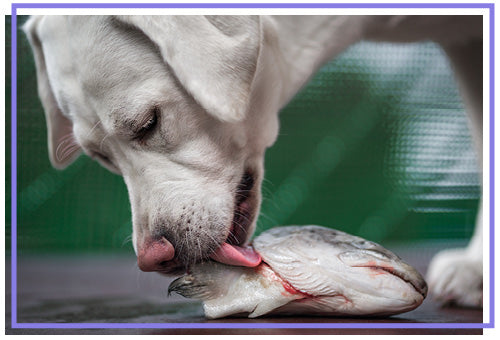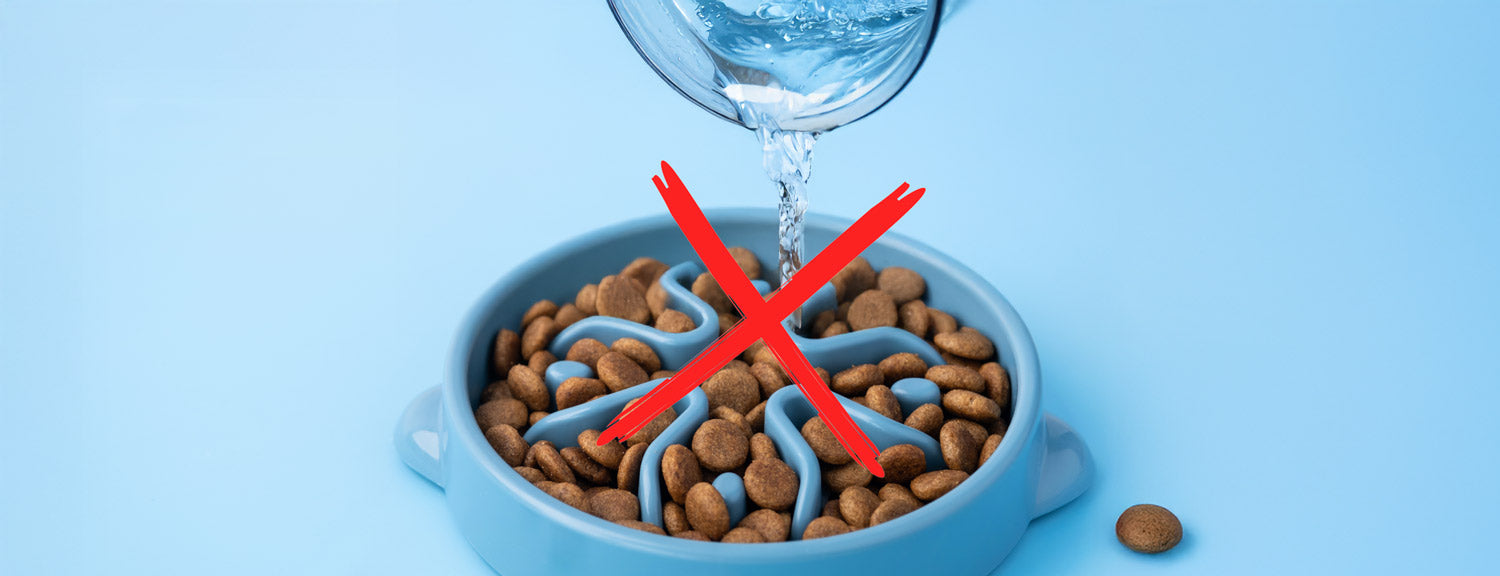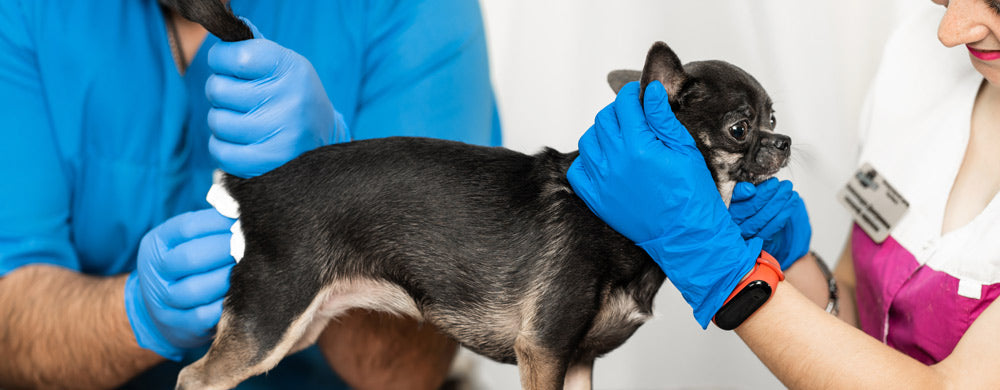Your basket is empty

Understanding the Basics of a Balanced Diet
July 26, 2023 7 min read
When it comes to our beloved canine companions, nothing is more crucial to their overall health and well-being than their diet. Just as we thrive on a well-balanced and nutritious diet, so do our dogs. Their meals are not merely about filling their bellies but fuelling their bodies in a way that promotes optimal health, longevity, and quality of life.By gaining a deeper understanding of dog nutrition, you can ensure you're offering your pup the best possible foundation for a long, happy, and healthy life.
Why Nutrition is Important for Dogs
Nutrition plays a pivotal role in the health of our dogs, affecting not just their physical well-being but their behavioural and emotional health too. A balanced, nutritious diet is instrumental in supporting growth and development in puppies, maintaining optimal bodily function in adult dogs, and supporting health and vitality in our senior companions.
Quality nutrition aids the body's natural defence system, enhancing immunity and reducing disease risk. It supports bone and muscle health, aids digestion, and promotes a shiny coat and healthy skin. Furthermore, it plays a crucial role in weight management, helping to prevent obesity—a condition that can lead to many health problems, including diabetes, arthritis, and heart disease.
A balanced diet also impacts a dog's energy levels and behaviour. Proper nutrition fuels your dog's daily activities, whether it's a walk in the park, a game of fetch, or simply their everyday antics. Dogs fed a balanced diet often display improved cognitive function, better training outcomes, and overall happier demeanour.
Moreover, a dog's diet can significantly affect its lifespan. Studies have shown that dogs who maintain an ideal body weight live substantially longer than their overweight counterparts. Thus, a well-balanced diet is the cornerstone of your loyal companion's healthier and longer life.
In the following sections, we'll unpack the intricacies of canine nutrition, helping you navigate the complex world of dog diets, so you can feel confident that every meal you serve contributes positively to your dog's long-term health and well-being.
***
Understanding Canine Dietary Needs
Just like humans, dogs are omnivores. This means they thrive on a varied diet, including proteins, carbohydrates, fats, vitamins, and minerals. Each nutrient is unique and vital in supporting your dog's health.
Proteins are critical in a dog's diet as they serve as the primary building blocks of the body's cells, tissues, and organs. They are vital for growth, tissue repair, and the production of essential antibodies, enzymes, and hormones. Moreover, protein supplies your dog with the necessary amino acids, which are essentially the 'building blocks' of proteins. While dogs can synthesise some amino acids on their own, others, known as essential amino acids, must be obtained from their diet.
Although not technically essential for dogs, carbohydrates provide an efficient source of energy. They can be found in fruits, vegetables, and grains, and once ingested, they're broken down into sugars (like glucose) that provide energy for your dog's brain and muscles. Furthermore, some types of carbohydrates, known as dietary fibre, contribute to digestive health by supporting healthy gut bacteria and aiding in bowel regularity.
Fats are another crucial source of energy for dogs, and they're essential for the absorption of certain vitamins (A, D, E, and K). They also provide essential fatty acids that the body can't produce on its own, such as omega-3 and omega-6 fatty acids. These are critical for maintaining healthy skin and a shiny coat, supporting the immune system, and promoting proper brain function.
Vitamins and minerals are needed in small but significant quantities in your dog's diet. They play crucial roles in various bodily processes, including bone growth, wound healing, energy production, and maintaining a robust immune system. Each vitamin and mineral has a unique role. For instance, calcium and phosphorus are necessary for healthy bones and teeth, vitamin A for vision, vitamin E and selenium for antioxidant functions, and B vitamins for energy metabolism.
A balanced diet for your dog should contain all of these nutrients in the right proportions. However, the specific dietary needs can vary based on the dog's age, breed, health status, and lifestyle. It's always advisable to consult with your vet to determine the best diet for your particular dog.
***
Nutritional Requirements by Life Stage
Puppies, adult dogs, and senior dogs each have unique nutritional requirements.
Puppies are rapidly growing and developing, requiring a nutrient-rich diet to support their growth. They need a higher protein diet compared to adults and an optimal balance of calcium and phosphorus to support bone development. It's crucial to feed puppies food specifically designed for their growth stage, ensuring they're receiving the appropriate nutrients in the right proportions.

While no longer growing, adult dogs still require a balanced diet to maintain their health. The focus should be on a balanced intake of proteins, carbohydrates, and fats to sustain energy, maintain muscle mass and support overall bodily functions.
Senior dogs often experience changes in metabolism and activity levels. They may require fewer calories to prevent weight gain but need a diet rich in high-quality protein to maintain muscle mass. They also benefit from increased fibre for digestive health and essential fatty acids for joint health and to support cognitive function.
In addition, breed and size can affect dietary requirements. Larger breeds may require more controlled growth formulas as puppies to prevent joint issues later in life. Smaller breeds may need diets higher in calories due to their fast metabolisms.
Each life stage presents its own set of nutritional requirements and potential health concerns, so feeding a diet specifically tailored to your dog's life stage is crucial in maintaining their overall health and well-being. In the upcoming sections, we'll delve deeper into the elements of a balanced diet for dogs, helping you discern the best nutrition strategy for your canine companion.
***
The Role of Commercial Dog Food
Commercial dog foods provide a convenient, accessible, and often cost-effective solution to meet your pet's nutritional needs. They are regulated by the Pet Food Manufacturers' Association in the UK, ensuring that these foods meet the nutritional standards set out by the European Pet Food Industry Federation (FEDIAF).
Commercial dog foods include kibble (dry food), canned (wet food), semi-moist, and even freeze-dried or dehydrated options. Each form has its own benefits, catering to different preferences and specific health requirements.
Manufacturers often produce diet ranges that cater to specific life stages (puppy, adult, senior), sizes (small breed, large breed), and even specific health conditions (e.g., food for dogs with kidney disease, food for overweight dogs). This means you can choose a food that's tailored to your dog's unique needs.
However, it's important to note that not all commercial dog foods are created equal. Some may contain high levels of fillers, low-quality proteins, and artificial additives, so it's crucial to read the labels and understand the ingredients. High-quality commercial foods will list a named protein source (like chicken or beef) as the first ingredient and be free from artificial colours, flavours, and preservatives.
***
Homemade Diets and Raw Feeds
For dog owners who prefer to have more control over their pets' diets, homemade meals and raw feeds offer an alternative to commercial dog foods. They allow you to select each ingredient that goes into your dog's meals, ensuring you know exactly what your pet is consuming.
Homemade diets allow you to use fresh, whole foods and tailor meals to your dog's taste preferences. However, formulating a nutritionally balanced homemade diet can be complex and time-consuming. It often requires consultation with a veterinary nutritionist to ensure that all necessary nutrients are included in the correct proportions.

Raw feeding, also known as a BARF diet (Biologically Appropriate Raw Food), is another option. Advocates of raw feeding argue that it's closer to a dog's ancestral diet, providing a range of potential benefits like improved coat condition, smaller stools, and increased energy levels. A raw diet typically includes raw meats, bones, organs, and in some instances, fruit and vegetables and dairy products.
Whether you feed commercial dog food, homemade meals, or a raw diet, the goal remains the same – to provide a nutritionally balanced diet that supports your dog's health and well-being. As every dog is unique, it's essential to discuss your dog's diet with your vet to ensure that their nutritional needs are being adequately met.
***
Dietary Supplements for Dogs
Dietary supplements can play a valuable role in ensuring that dogs get the necessary nutrients to stay healthy, especially when their diet does not meet specific nutritional needs. These might include vitamins, minerals, fatty acids, probiotics, and joint supplements, among others.
Some dogs might benefit from supplements, particularly those with specific health conditions. For instance, a dog with joint issues might benefit from glucosamine and chondroitin supplements, while a dog with a dull coat might improve with Omega-3 and Omega-6 fatty acid supplements. Probiotics can support digestive health, especially in dogs suffering from gastrointestinal issues.
It's important to note, however, that dietary supplements are not a substitute for a balanced diet. They should be used to complement a good diet and not make up for nutritional deficiencies in a poor one. As some supplements can interact with certain medications or might not be needed in some cases, it's always wise to consult with a vet before starting your dog on any dietary supplements.
***
How to Transition Your Dog to a New Diet
Switching your dog's diet can be more complex than swapping one food for another. Dogs, especially those with sensitive stomachs, may need time to adjust to new foods. Introducing any diet change gradually is essential to avoid upsetting your dog's digestive system.
A common method is introducing the new diet gradually over a week. You could start by replacing about 20% of their current food with the new food for a couple of days, then gradually increase the new food's proportion while decreasing the old food over the next several days.
Throughout the transition, keep an eye on your dog for any signs of distress, such as vomiting, diarrhoea, or loss of appetite. If you notice any of these signs, it's best to consult your vet before proceeding further. Remember, patience is key when transitioning diets. It's important to allow your dog's system time to adjust.
***
Conclusion
Understanding the basics of dog nutrition is fundamental to ensuring your dog's overall health and longevity. The right diet, appropriately balanced for your dog's life stage, breed, size, and health status, can significantly impact their vitality and well-being.
As dog owners, it's our responsibility to make informed decisions about our pet's diet. Whether you choose commercial food, a homemade diet, raw feeding, or a combination, the diet should meet your dog's specific nutritional needs. Regular vet consultations are key to this process, helping tailor dietary approaches to individual dogs and addressing any dietary concerns or questions you may have. After all, a well-nourished dog is a happy and healthy dog. Nutrition is one of the best ways you can show your canine companion just how much you love them.
Also in Pet Advice

Should You Add Water to Your Dog’s Kibble? Here’s What the Science Says
August 14, 2025 7 min read
Should you add water to your dog’s kibble? Discover the science-backed pros, cons, and better alternatives like bone broth and fresh food to improve hydration, digestion, and overall canine health...

DIY Frozen Dog Treats Your Pup Will Love
June 27, 2025 4 min read
Summer heat can be dangerous for dogs, making hydration more important than ever. Learn how to spot signs of dehydration, boost your pup’s water intake, and create fun, frozen recipes to keep them happy and healthy all season long.

Why Is My Dog Scooting? Common Causes and How Diet Can Help
May 09, 2025 4 min read
If your dog is scooting or smells fishy, it could be due to blocked or irritated anal glands. Learn what causes blocked anal glands, which dogs are most at risk, and how simple dietary changes—like adding fibre and anti-inflammatory nutrients—can help prevent recurring problems.
